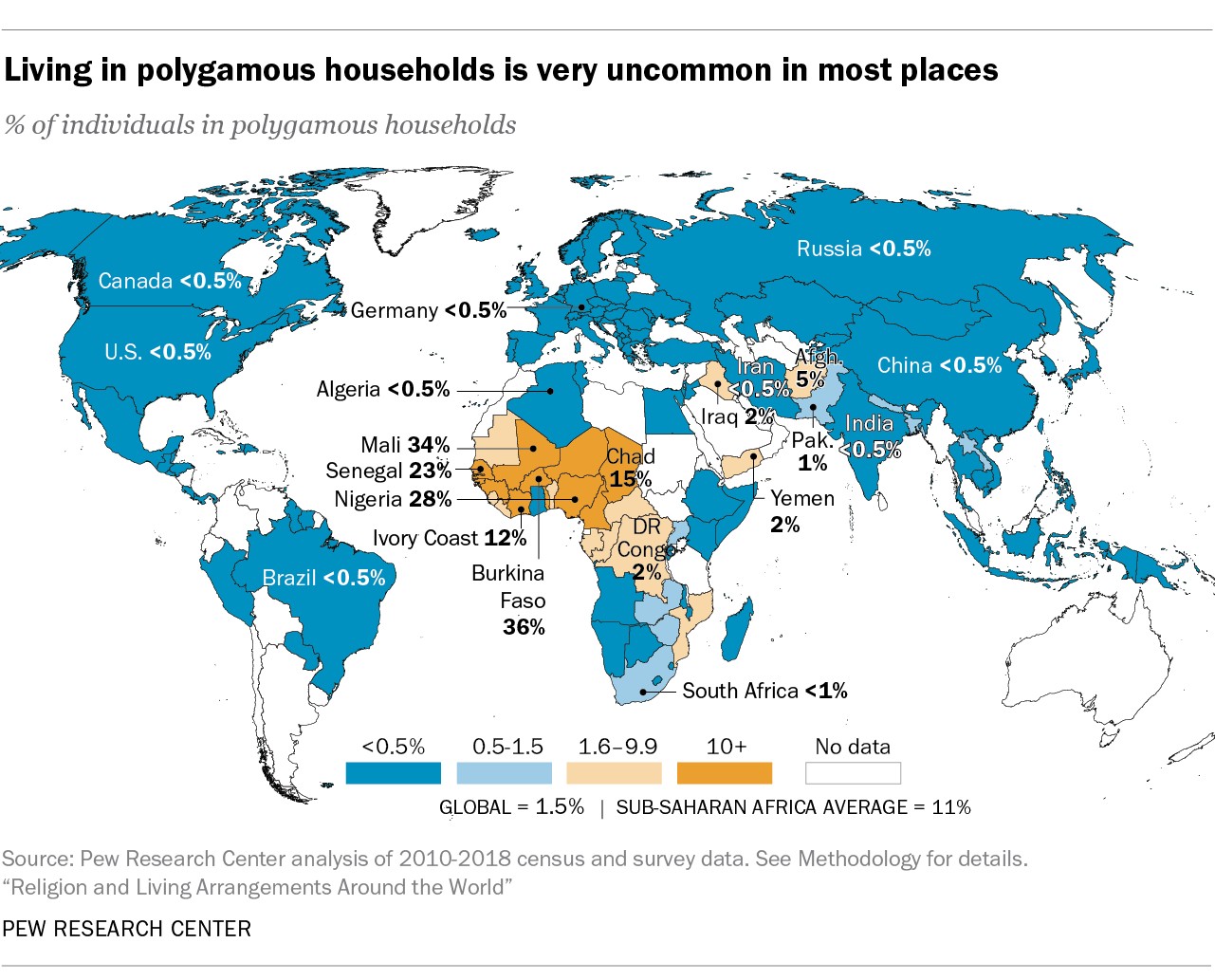Polygamy, the practice of having more than one spouse, is uncommon in most parts of the world. In many Western countries, particularly the United States, it carries a historical stigma and is legally prohibited. While prosecutions for simply cohabiting with multiple partners are rare in the U.S., marrying someone while already married to another person is against the law in every state. This raises a fundamental question: Why Is Polygamy Illegal in so many places? This article delves into the reasons behind the legal prohibitions of polygamy, its global prevalence, and the varying cultural and religious perspectives that shape its status.
The Legal Landscape of Polygamy Around the World
Legally, the stance against polygamy is strong in numerous nations. The United Nations Human Rights Committee has explicitly stated that “polygamy violates the dignity of women” and advocates for its definitive abolishment globally. This perspective aligns with many countries, especially in the West, where monogamy is the legally and socially accepted form of marriage. However, the enforcement and legal definitions of marriage can differ significantly across cultures. In many regions, particularly in parts of Africa, the Middle East, and Asia, religious or customary laws hold considerable sway over marriage regulations, sometimes superseding or existing alongside national legal frameworks. This creates a complex situation where the legality of polygamy can vary greatly, even within a single country.
In the United States, the criminalization of plural marriage dates back to 1882, rooted in both societal norms and historical contexts, particularly concerning the practices of early Mormon communities. While Utah has recently lessened penalties for consensual adult polygamous relationships, bigamy, the act of marrying multiple spouses, remains illegal across the U.S. This legal stance is mirrored in much of Europe, Australia, and South America, where monogamy is the established legal standard for marriage.
Conversely, in various parts of the world, polygamy, specifically polygyny (where a man has multiple wives), is legal, though not always widely practiced. This is particularly true in many Muslim-majority countries and across the “polygamy belt” of West and Central Africa. However, even in countries where it is legal, the actual prevalence of polygamous households is often low.
Reasons Behind the Illegality of Polygamy
Several factors contribute to why polygamy is illegal in many countries, primarily revolving around human rights, gender equality, and societal norms.
Protection of Women’s Rights: A central argument against polygamy is its potential to infringe upon the rights and dignity of women. Critics argue that polygamous systems often lead to unequal power dynamics within families, potentially marginalizing women and limiting their autonomy. The UN Human Rights Committee’s stance reflects this concern, emphasizing the need to protect women from discriminatory practices often associated with polygamy.
Societal Norms and Historical Context: In many Western societies, monogamy has become deeply ingrained as the normative and legally recognized form of marriage. This is partly due to historical, cultural, and religious influences that have shaped societal expectations around family structures and relationships. Laws against polygamy in these regions often reflect these long-standing monogamous traditions.
Ethical and Moral Considerations: Beyond legal and rights-based arguments, ethical and moral considerations also play a role in the prohibition of polygamy. Many societies view monogamy as the ideal foundation for stable family units and child-rearing, believing that polygamy can lead to complex family dynamics and potential emotional and financial strain, particularly on women and children.
Maintaining Social Order: Historically, some arguments against polygamy have also been rooted in concerns about social order and potential instability. While these arguments are less prominent today, they reflect historical anxieties about the social implications of non-monogamous relationships, particularly in societies where monogamy is seen as a cornerstone of social structure.
Global Prevalence and Cultural Context
Despite its legal allowance in some regions, polygamy is not a widespread practice globally. Studies indicate that only a small percentage of the world’s population lives in polygamous households, with the vast majority of countries having rates below 0.5%. The practice is most concentrated in sub-Saharan Africa, where approximately 11% of the population resides in polygamous households. Within this region, countries like Burkina Faso, Mali, and Nigeria show significantly higher rates.
Religion plays a complex role in polygamy. While often associated with Islam, particularly due to verses in the Quran and historical practices, the prevalence of polygamy varies significantly across Muslim-majority countries. In many, including Afghanistan, Pakistan, and Egypt, polygamy rates are low. Conversely, in certain African nations, polygamy is practiced across various religious groups, including Muslims, Christians, and those adhering to folk religions. Historically, even within Judaism and Christianity, instances of polygamy are noted in ancient texts, though these religions have largely disavowed the practice in modern times.
Shifting Perspectives and Moral Acceptability
Interestingly, attitudes towards polygamy are evolving in some parts of the world. In the United States, for example, the percentage of adults who find polygamy morally acceptable has been steadily increasing, although it remains a minority view. This shift in perspective, particularly among more liberal demographics, suggests a potentially changing societal understanding of marriage and family structures. However, significant moral and ethical objections to polygamy persist, particularly concerning gender equality and individual rights.
Conclusion: Balancing Rights, Culture, and Legality
The question of why polygamy is illegal is multifaceted, encompassing legal frameworks, human rights concerns, cultural norms, and ethical considerations. While international bodies and many nations actively discourage or prohibit polygamy to protect women’s rights and promote gender equality, the practice persists in certain regions, often intertwined with religious and customary traditions. As societal attitudes evolve and discussions around marriage and family structures continue, the legal and social status of polygamy will likely remain a subject of ongoing debate and varying perspectives worldwide.

